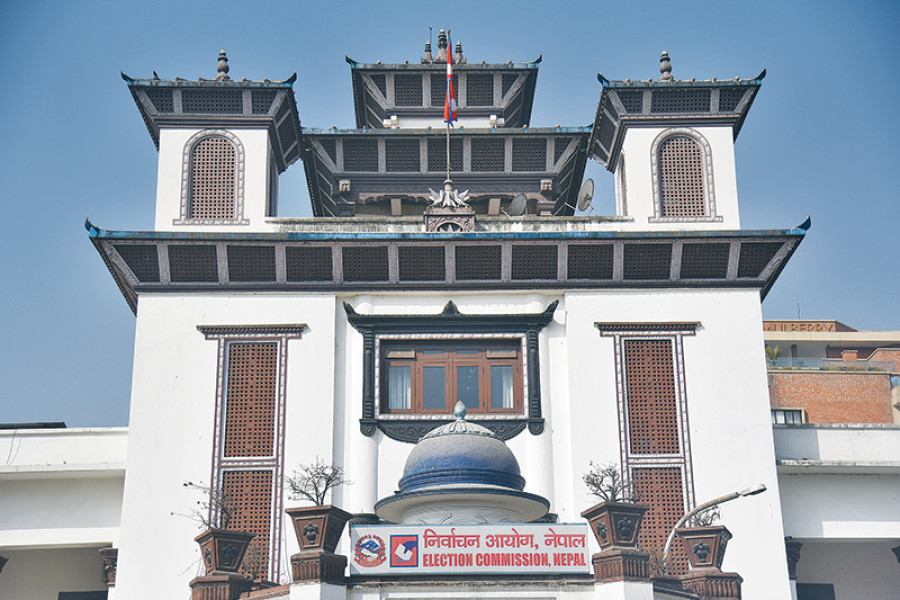National
Election commission to set up 21,000 polling booths
Preparations for elections moving forward smoothly, officials say even as settlement of the Nepal Communist Party dispute appears far off.
Post Report
Even though Prime Minister KP Sharma Oli on Friday criticised it for failing to press ahead with preparations for elections, the Election Commission has said its preparations for the polls are moving ahead smoothly.
On December 20, President Bidya Devi Bhandari announced snap parliamentary elections on April 30 and May 10 after dissolving the House of Representatives as per recommendation from the Cabinet, inviting a vertical split in the ruling Nepal Communist Party.
Even though the dispute in the ruling party has reached the commission—and it’s yet to decide which faction gets to inherit the party name and the electoral symbol, the poll body has intensified its legal and logistical preparations for the elections.
According to the commission, the task of updating voters’ registration and deciding the location of polling booths have reached their final stage. “We have already received recommendations for polling centres from all districts,” said Komal Prasad Dhamala, assistant spokesperson for the commission. “Based on those recommendations, around 21,000 polling centres will be set up in the upcoming election.”
Even though the Dahal-Nepal faction has been opposing poll preparations, officials at the commission say leaders and cadres of the faction have been cooperating with the commission in determining polling booths in the districts.
“They are cooperating with us in determining the polling centres. We have faced no obstruction from them,” said Dhamala. The Oli faction of the ruling party and Nepali Congress have been telling the commission to accelerate preparations for elections.
During the previous federal and provincial elections in 2017, a total of 19,809 polling booths were established across the country. According to the commission, around 16.3 million people are on the voters’ list after the latest update compared to the 15.42 million ahead of the 2017 polls.
After the government approved the budget for the commission as demanded by the poll body, it is also preparing to procure stationary materials such as paper, ink and stamps among others.
Earlier, the commission had sought a budget of Rs7.07 billion from the government for necessary preparations to hold the upcoming elections. “The government approved our budget estimate. We are getting the budget on installment basis,” said Dhamala.
After the resources were assured, the commission has been preparing to procure goods necessary to conduct the elections. According to Dhamala, the commission has identified 57 types of goods required for holding the elections. “We will soon issue a notice for procuring these items,” said Dhamala.
The commission, however, said it does not need to procure new ballot boxes as it still has around 90,000 ballot boxes from the last general elections.It expects that only around 45,000 ballot boxes will be required this time considering the 21,000 polling booths.
The commission is also preparing to procure materials related to voters’ education and election-related laws printed to run voter education programmes. It has approached the Janak Education Material Centre for printing of these materials.
“As requested by the commission, we sent a cost estimate early this week by quoting the prices for printing the ballot papers, legal documents, voters’ education materials among others,” said Chitra Acharya, spokesperson for the centre. “We are awaiting a response from the commission.”
The election body expects to arrange most of the necessary election materials by mid-March. The commission has also prepared the election code of conduct for political parties and other stakeholders. “We have organised interactions on the draft code of conduct in all 77 districts,” said Dhamala.
Earlier this week,the commission also held interactions with representatives of political parties at the commission’s head office.
Officials at the commission said even though it has limited time before the first phase of elections, it is well prepared to arrange the necessary logistics. But, the commission is yet to invite political parties to register themselves for election purposes.
Printing of ballot paper will be difficult without settling the dispute in the Nepal Communist Party as Janak Education Material Centre has said it needs 20-25 days to complete printing around 35 million ballot papers.
But, the commission has been dallying its decision on the matter even though the Dahal-Nepal faction formally laid claim to the Nepal Communist Party three weeks ago.
“Settling the dispute within the Nepal Communist Party as early as possible is important to create a conducive environment for polls,” admitted Dhamala.




 13.12°C Kathmandu
13.12°C Kathmandu













